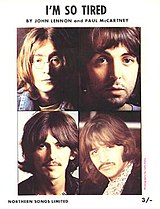I'm So Tired
| "I'm So Tired" | |
|---|---|
 Cover of the song's sheet music | |
| Song by the Beatles | |
| from the album The Beatles | |
| Released | 22 November 1968 |
| Recorded | 8 October 1968 |
| Studio | EMI, London |
| Genre | Rock, blues rock |
| Length | 2:03 |
| Label | Apple |
| Songwriter(s) | Lennon–McCartney |
| Producer(s) | George Martin |
| Audio sample | |
"I'm So Tired"
| |
"I'm So Tired" is a song by the English rock band the Beatles from their 1968 double album The Beatles (also known as "the White Album"). It was written and sung by John Lennon, though credited to Lennon–McCartney. Lennon wrote the song during the Beatles' stay in India about insomnia he was having due to constant meditation and because he missed Yoko Ono. The song was recorded in the same session as another White Album song, "The Continuing Story of Bungalow Bill".
Composition[]
Lennon wrote the song at a Transcendental Meditation camp when he could not sleep; the Beatles had gone on a retreat to study with the Maharishi Mahesh Yogi in Rishikesh, India. After three weeks of constant meditation and lectures, Lennon missed Yoko Ono, with whom he had yet to start a relationship, and was plagued by insomnia, which inspired the song. One of dozens of songs the Beatles wrote in India, "I'm So Tired" detailed Lennon's fragile state of mind. It was also an open letter to Yoko Ono, whose postcards to Lennon in India were a lifeline. "I got so excited about her letters," he said. "I started thinking of her as a woman, and not just an intellectual woman."[1] Lennon later said of it: "One of my favourite tracks. I just like the sound of it, and I sing it well".[2]
The theme of insomnia complements Lennon's earlier song "I'm Only Sleeping" on the Revolver album.
The song is in the key of A major.
Recording[]
An early demo of the song was recorded at George Harrison's Esher home, in May 1968. It was basically identical to the released version, in terms of verse, but it does include a spoken section reminiscent of a similar section in "Happiness Is a Warm Gun". It goes:
When I hold you, in your arms,
When you show me, each one of your charms,
I wonder should I get up, and go to the funny farm.
No, no, no!
This section was probably improvised at the time, as it was never used again. The song was recorded on 8 October 1968 and was completed including all overdubs in this one session.[3] The Beatles also started and completed "The Continuing Story of Bungalow Bill" during the same recording session.[3] The chorus of the monaural mix of the song features louder backing vocals from Paul McCartney than the stereo mix.
"Paul is dead" conspiracy theory[]
At the very end of the song, what seems to be nonsensical mumbling can be heard in the background. The mumbling, if played backwards can be imagined as something along the lines of "Paul is a dead man. Miss him. Miss him. Miss him."[4] This only adds to the many supposed references to the "Paul is dead" conspiracy theory scattered throughout the White album. Mark Lewisohn has said that the mumbling is actually Lennon muttering, "Monsieur, monsieur, how about another one?"[3]
Legacy[]
Coinciding with the 50th anniversary of its release, Jacob Stolworthy of The Independent listed "I'm So Tired" at number 18 in his ranking of the White Album's 30 tracks. He wrote of the song: "The weary vocals from John Lennon remains desperately alluring to this day. A favourite of his, the song is best when viewed as a sequel to Revolver track, 'I'm Only Sleeping'."[5]
Personnel[]
- John Lennon – lead vocal, acoustic guitar, lead guitar, Hammond organ
- Paul McCartney – bass guitar, electric piano, backing vocal
- George Harrison – lead guitar
- Ringo Starr – drums
- Personnel per Ian MacDonald[6]
Notes[]
- ^ "83 – 'I'm So Tired'". 100 Greatest Beatles Songs. Rolling Stone. Retrieved 17 June 2012.
- ^ Sheff 2000, p. 199.
- ^ Jump up to: a b c Lewisohn 1988, p. 160.
- ^ I'm So Tired – Backwards
- ^ Stolworthy, Jacob (22 November 2018). "The Beatles' White Album tracks, ranked – from Blackbird to While My Guitar Gently Weeps". The Independent. Retrieved 27 March 2019.
- ^ MacDonald 2005, p. 324.
Repeated listening will reveal that John is saying "stupid get", not git. Get was "common" parlance in Liverpool and used at least by my grandmother, born in 1898.
1946 references are too recent.
References[]
- Lewisohn, Mark (1988). The Beatles Recording Sessions. New York: Harmony Books. ISBN 0-517-57066-1.
- MacDonald, Ian (2005). Revolution in the Head: The Beatles' Records and the Sixties (Second Revised ed.). London: Pimlico (Rand). ISBN 1-84413-828-3.
- Sheff, David (2000). All We Are Saying. New York: St. Martin's Griffin. ISBN 0-312-25464-4.
External links[]
- Songs about sleep
- The Beatles songs
- Song recordings produced by George Martin
- 1968 songs
- Songs written by Lennon–McCartney
- Rock ballads
- 1960s ballads
- Songs published by Northern Songs